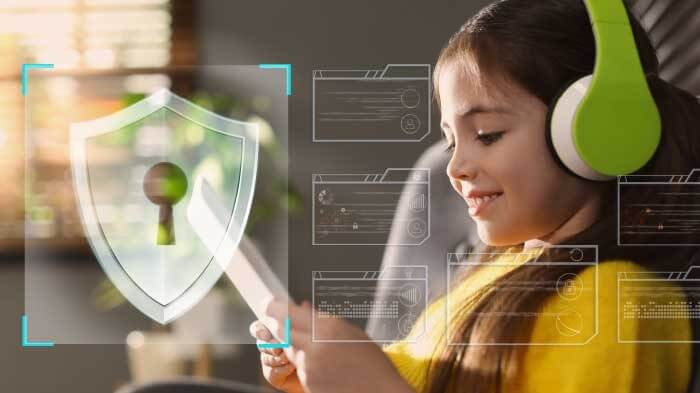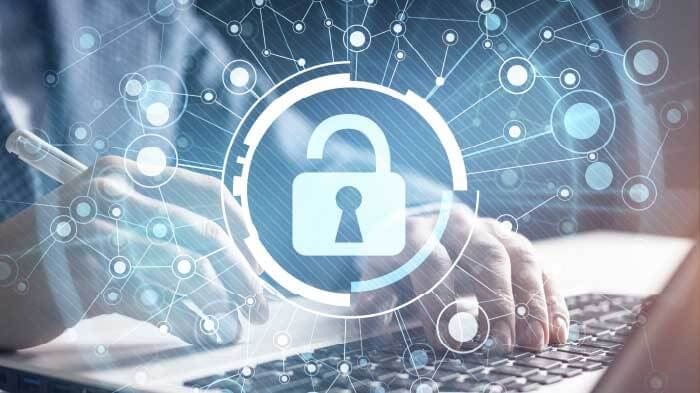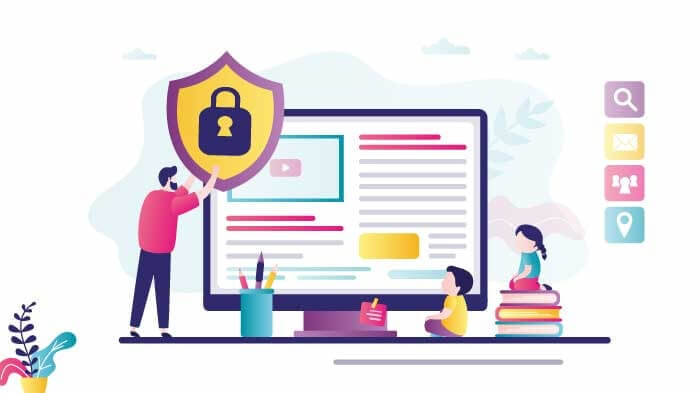Cybersecurity for Kids: 5 Practical Ways to Explain It
Whether in the home or the classroom, your children’s safety is incredibly important. But what about the online environment?

According to a study, almost half of children between 8 and 16 are online all day, therefore the topic of internet safety for kids should be at the forefront of every parent’s mind.
So when we discuss cybersecurity for kids, what threats should we worry about?
Good cybersecurity skills can protect your children from:
- Viruses
- Malware
- Online predators
- Cyberbullying
- Offensive materials
- Child identity theft
With internet usage becoming a necessity in many ways, restricting your children’s access isn’t a viable solution. Instead, you can ensure your kids’ safety by educating them about good cybersecurity practices.
Children can have fun and learn at the same with a child-safe app, MentalUP! 🤗
MentalUP is the only app that features 150+ brain games and 240+ fitness games for kids. These exercises are developed by pedagogues, academicians, and game designers. 💯🙌
Thanks to MentalUP has no ads and is suitable for all aged kids' experience, it doesn't require parental control when children play with it. Your child can be completely safe using the award-winning app! 👨👩👧✨
What Is Cybersecurity? Cybersecurity Awareness for Parents

Cybersecurity is the protection of computers and systems from information theft or damage, in the simplest terms. Learning more about this subject can protect you and your children from the two types of online hazards: social threats, like predators and scammers, and digital threats, like viruses and malware.
There are various components of cybersecurity that can be incredibly difficult to grasp, making it much harder to teach to a child. Once you decide what information your kids need, you have to consider how to present it.
You need to find a unique approach when discussing cybersecurity with kids. Finding a way to connect with your children, and talk about their online use without boring them or making them uncomfortable, will help them absorb the concepts.
You can follow a couple of easy guidelines to make this process straightforward and painless.
5 Cybersecurity Tips for Parents
There are a couple of simple actions you can take to make educating your children a breeze. By simplifying subjects, establishing ground rules, and creating trust, you can not only protect your children online but teach them how to protect themselves.
1. Use Child-Friendly Educational Resources.
Cybersecurity can be an incredibly complex subject, so it’s best to find resources tuned to your child’s specific learning level.

The most efficient way to do this is to study on your own and distill the language down into child-friendly pieces. No one knows your child better than you, so try to approach the subject in a way you know they’ll understand.
For example, younger children might not understand what you mean by saying cybersecurity for kids. If they don’t understand, break that word apart for them.
Explain that “Cyber” means taking place on the internet, and “Security” means being safe. Then, they’ll understand you want to talk to them about being safe on the internet.
Take each cybersecurity topic with a similar tact: break subjects down and give simple explanations, so your child can understand what is being discussed and how they can apply it.
2. Set Up Some Basic Internet Safety Rules for Kids.
Setting up some rules can be a great way to teach your children online boundaries early.

These rules should focus on keeping them safe and should usually be guidelines like:
- No giving out information to strangers online: Tell your kids they never should give out personal information on the internet. That means their full name, home address, school, and anything else that could put them in danger.
- Only visit secure websites: Teach your children what a URL is, and show them the difference between a secure website (HTTPS) and an unsecured website (HTTP).
- Ask an adult before downloading: Before downloading any file onto their computer, have your child talk to you first. Malware can easily fool children, disguising itself as a game or video they may want to see. While you should also teach them how to tell these files apart, it’s more straightforward in the beginning to ask for permission.
3. Focus On Empowerment.
Children respond to responsibility, and if you give them respect, they are more likely to listen.

Your children will be online; this is unavoidable. If you empower them and tell them it’s their responsibility to keep their computer secure, you will be amazed at their motivation to do so.
Setting a good example is another way to empower your children online. If they see you constantly scrolling, being disrespectful online, or posting inappropriately, they may follow suit. You want their behavior to match yours, so make sure to monitor your own online activity.
You also don’t want to talk down to older children when discussing cybersecurity for kids. More often than not, younger generations know more about technology. Make sure to ask your child just how much they know, so you don’t end up explaining concepts they already understand.
Empowerment means trust, and your children will often be alone when surfing the web. It can be scary, but you can’t be around every second. Giving your children trust and responsibility will make them more attentive to their security.
4. Create A Trusting Environment.
That trust will set them up for success online and in life. As long as you let them know they can come to you for guidance, you’ll be surprised at how well your child can do on their own.

Of course, you want to make sure to check in with them periodically, and having your rule sheet up and visible doesn’t hurt
That being said, make sure to explain to your children who they should not trust. With many kids active on social media, there is an increased chance they could interact with strangers. Tell your kids that stranger danger applies to online interactions as well: If someone you don’t know tries to contact you, inform an adult immediately.
You need to trust your children enough to talk to them about cybercrimes. It can be tough to discuss complex subjects like online predators or identity theft with a child, but it’s necessary for cybersecurity for kids. Knowing what threats are out there will help them look out for warning signs and better use online tools to help them stay safe.
5. Use The Right Tools To Help Keep Children Safe.
While there are a wide variety of programs that can restrict your child’s internet access, like content filters and lock screens, these do little to protect them when they are alone.

You need to show your children what tools they can use to safely browse and how to properly operate them.
Many tools can protect your children online, including:
- Anti-virus software
- Firewalls
- Password managers
- Advanced security settings
- Identity theft monitoring
Some of these tools are free, with the only requirement being that they are activated and regularly updated. You can often set these tools to update automatically, so your children don’t have to worry about doing so manually.
Let your children know what an update window may look like so they don’t stop these downloads accidentally. Make sure to inform them that if those programs detect any viruses, come and find an adult as soon as possible.
Some tools are entirely free and often not considered safety tools at all, like passwords. Creating a password is a requirement for most online accounts, and children usually make an easy one so they can remember. Teach your kids about creating strong passwords, so they can keep their accounts secure and safe.
A strong password should have letters (both upper and lower case), symbols, and numbers. Try to find phrases and numbers they are familiar with so that the password is easy for them to understand but difficult for someone trying to steal their information. This is where a password manager can come in handy!
Cybersecurity For Kids Is More Important Than Ever
The online world will continue to grow as time goes on, and its role in our children’s lives will only increase.
Whether it be using computers for online learning or work as they transition into adulthood, starting their education early is critical. It’s never too early to start talking to them about cybersecurity for kids.
By educating ourselves first, keeping the process exciting, and using cybersecurity tips, you can ensure your children have a solid understanding of security online. Doing so can keep them safe, both digitally and socially, so you can have peace of mind.
Moreover, keep in mind that by using safe learning games for toddlers, children, or teens, you can always help them to develop themselves by the appropriate sources.
Keep up your children's need to use technology to have fun and learn with MentalUP! 💻📱
MentalUP offers 150+ brain games in different areas such as memory, attention, logic, visual, and language. There are also more than 240 fitness exercises for kids! 🧠🤸
MentalUP is child-safe and ad-free, so it is the favorite app of both parents and kids! 👨👩👧






